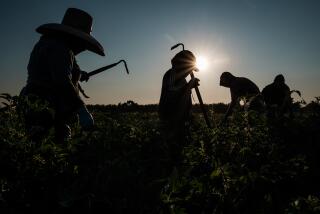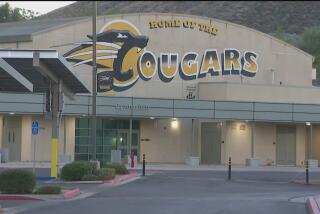Sowing the Chavez Legacy on Campus
- Share via
OXNARD — Four days after Gov. Gray Davis signed a bill making late farm worker leader Cesar Chavez’s birthday a state holiday, his grandson shared the news Tuesday with hundreds of students at El Rio Elementary School.
Nineteen-year-old Cesar Chavez told the students--themselves migrant workers’ children--that every year on March 31 they and other students throughout California will honor his grandfather by learning about Chavez’s struggles to improve wages and working conditions for farm laborers. He praised the law for also encouraging students to also pay tribute to Chavez by volunteering in their communities on that day.
“This is going to help his legacy live on and will help people know what he stood for,” Chavez said.
Many of the El Rio students, enrolled in a summer school program for children of seasonal farm laborers, said they are excited about the new holiday because most of their parents earn a living bent over strawberry and lettuce fields on the Oxnard plain.
“We want to celebrate Cesar Chavez’s birthday because he helped everyone and he helped some of our parents,” 11-year-old Leti Lopez said.
Leti and her classmates know all about Cesar Chavez. They know he helped many of their moms and dads. They know he helped protect their parents from getting sick from pesticides. They know he got rid of the short-handled hoe that led to disabling back problems among farm workers.
And they know he lived in Oxnard, just like they do.
“He changed everything, so the farm workers wouldn’t be tired and their backs wouldn’t hurt,” said Arthur Gonzalez, 11, whose father works in Oxnard’s strawberry fields.
The younger Chavez was invited to El Rio by Denis O’Leary, president of the Ventura County chapter of the California Assn. for Bilingual Education. O’Leary teaches at El Rio Elementary and volunteers with the United Farm Workers union, which the elder Chavez helped found in 1962.
The younger Chavez, who frequently visits schools and community centers to talk about his grandfather, lives in La Paz, Calif., and works as a Web site designer for Radio Campesina, the farm workers’ communication network.
He said he welcomed the invitation to visit the Ventura County school, especially because his father, Anthony Chavez, was born in El Rio and his grandfather lived in nearby La Colonia for a short time in 1938 and again two decades later, working in the Oxnard fields.
In addition to visiting 10 classrooms, Chavez spoke to a room of Spanish-speaking parents who were enrolled in an English class at the school.
Davis created Cesar Chavez Day in California, the first paid state holiday in the nation to honor the leader, by signing a bill during a rally Friday in Los Angeles. California, along with Texas and Arizona, already had designated a day in honor of Chavez.
The holiday has drawn some criticism because farm workers point out that state employees will get a paid day off March 31 while field workers will very likely continue to labor in the fields.
But around El Rio Elementary School, students and teachers had only good things to say about the holiday.
Teacher Rossana Padilla said the day recognizes the impact Chavez made on California. And she was pleased the young Chavez had visited the school because her students can then identify with his grandfather’s plight.
“They’ve helped their parents in the field, and they know what it’s like, that it’s back-breaking work,” she said.
Chavez was the voice for California’s farm workers from the 1960s until his death in 1993. The labor leader, an advocate of nonviolent protest, fought for better working conditions by staging hunger strikes, organizing marches and leading grape boycotts.
According to the new state guidelines, California’s public school students will spend the morning of March 31 learning about Chavez’s life and dedication to improving the lives of farm workers. In the afternoon, students will be encouraged, but not required, to work in the community with the California Conservation Corps or the AmeriCorps program.
At the end of each of Tuesday morning’s classroom presentations, Chavez led the students in singing “De Colores,” a rallying song of the farm workers. And he signed dozens of autographs with his grandfather’s motto, “Si se puede,” or “Yes we can.”
More to Read
Sign up for Essential California
The most important California stories and recommendations in your inbox every morning.
You may occasionally receive promotional content from the Los Angeles Times.










